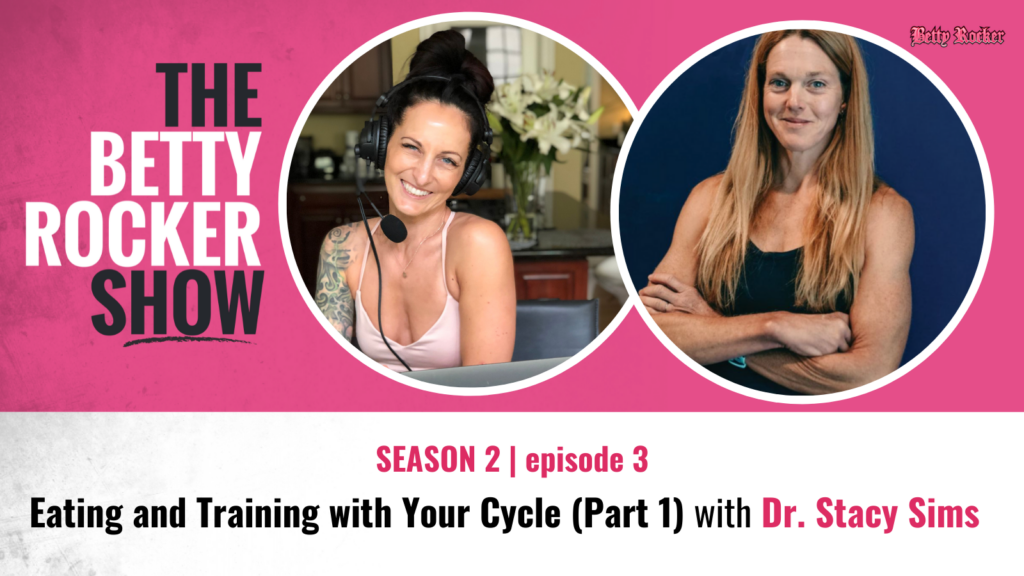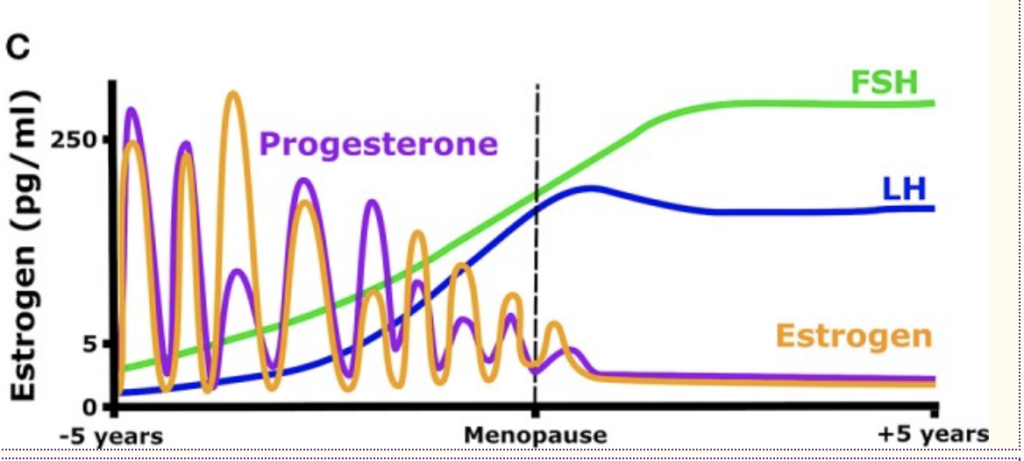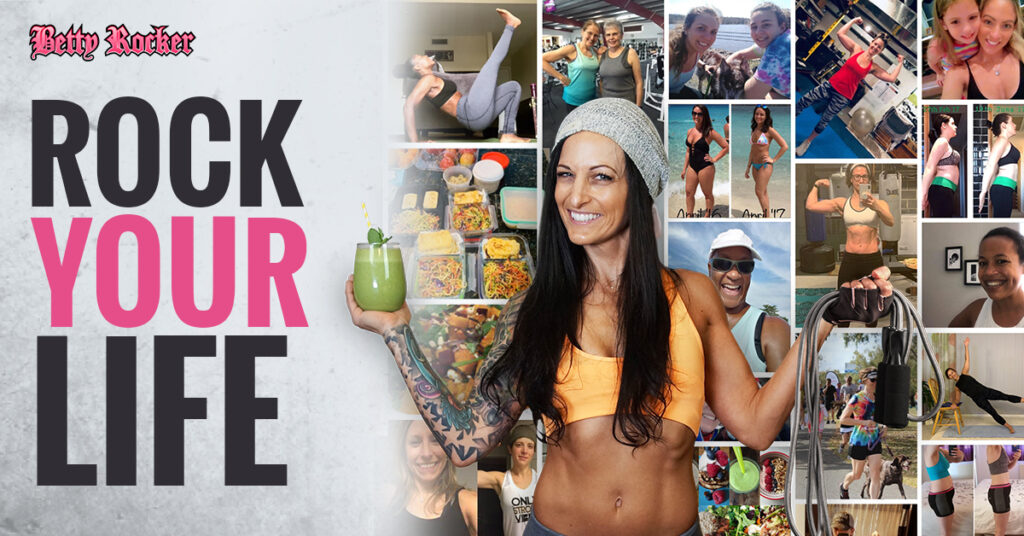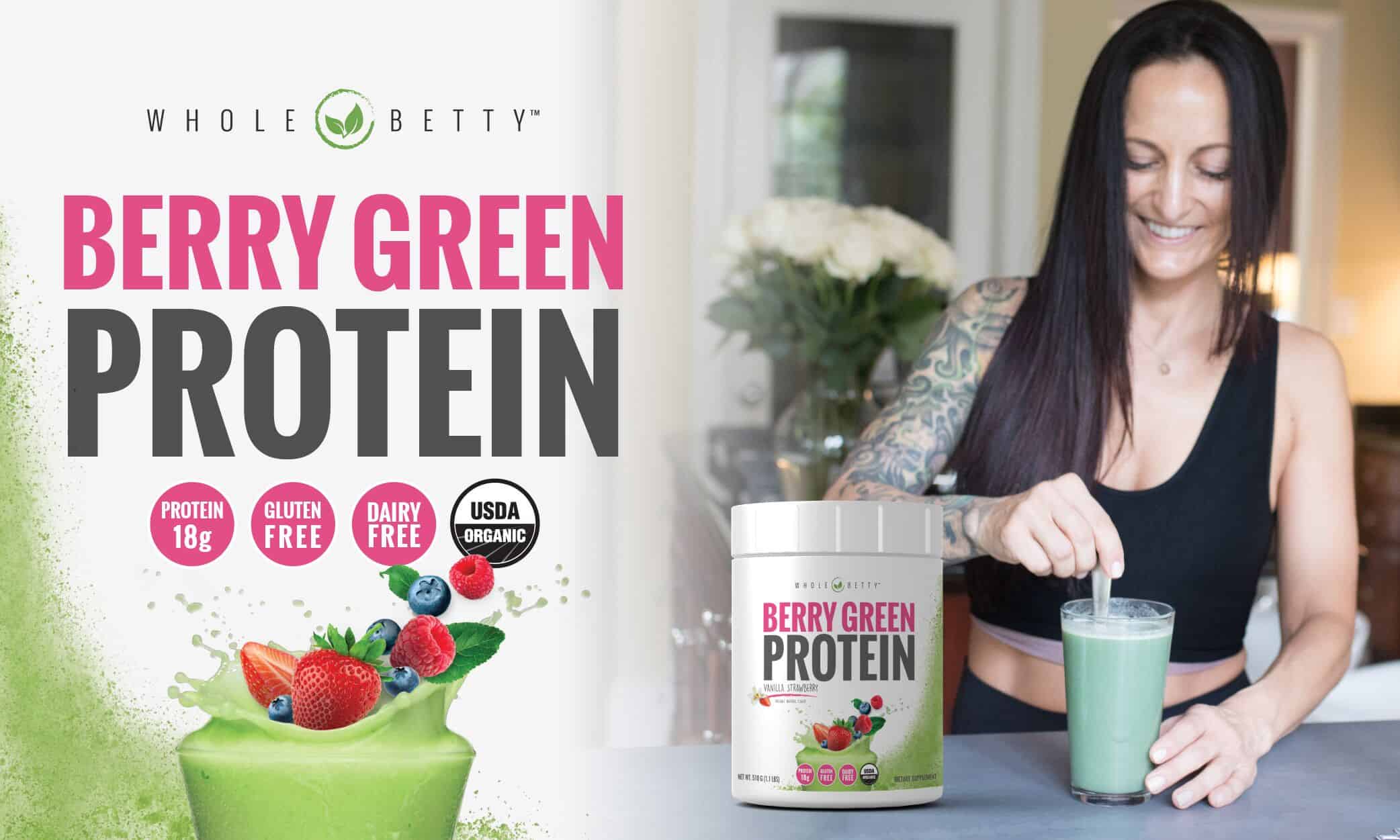
Welcome to The Betty Rocker Show, the place to be to nourish your mind, love your body, and rock your life.
When it comes to exercise and nutrition, women need different strategies than men in order to take advantage of the unique physiology of the menstrual cycle and the stages of their life cycle due to shifting hormones and how they impact the body.
Previous research on fitness and nutrition has largely been focused on male test subjects, leaving women out of the equation.
Dr. Stacy Sims is here to dive into how our amazing female physiology works in relation to our hormone cycles – through our menstrual years and post menopause, and break down some of the strategies you can harness to take advantage of the cyclical nature of your hormones in relation to your eating and training.
Dr. Sims is an applied researcher, innovator, and entrepreneur in human performance, specifically sex differences in training, nutrition, and environmental conditions.
She served as an exercise physiologist and nutrition scientist at Stanford University from 2007 to 2012, where she specialized in sex differences with environmental and nutritional considerations for recovery and performance, specializing in women’s health and performance.
A regularly featured speaker at professional and academic conferences, including those hosted by US Olympic Committee, High-Performance Sport NZ, and USA Cycling, she is a Senior Research Associate at AUT University and resides at the beach in Mt. Maunganui, New Zealand with her husband and young daughter.
This is a 2-part series, so get ready to learn a lot and start applying it right away! Coming up in part 2 of this conversation we’ll be talking more about peri and post menopause, more training and nutrition considerations for all of us, as well as discussing intermittent fasting and the keto diet and if the research really supports them for women. You won’t want to miss it.

Together we can shift the destructive narrative and elevate women in research, science, and sport.“
In This Episode You’ll Discover:
Meet Dr. Stacy Sims [1:03]
- Dr. Stacy Sims website
- TED Talk: Women are Not Small Men
- ROAR: How to Match Your Food and Fitness to Your Unique Female Physiology for Optimum Performance, Great Health, and a Strong, Lean Body for Life
The female cycle through the life cycle [4:37]
- Puberty
- Pre-menopause – our reproductive years
- Low hormone phase – the follicular phase phase (see diagram below)
- High hormone phase – the luteal phase (see diagram below)
- The length of the menstrual cycle

- Our 40’s and peri-menopause
- The changing cycles of estrogen and progesterone
- Menopause and post menopause

The jobs of estrogen and progesterone during our reproductive years [10:00]
- Low hormone phase: the start of your cycle
- Why studying women only in the low hormone phase doesn’t give us the full picture
- Ovulation and how it affects the hormone levels
- Estrogen’s impact on the system
- High hormone phase and the rise of progesterone
- Progesterone’s impact on the system
- When the period starts
- Impacts of the high hormone phase on energy
- Impact of the high hormone phase on exercise
- Impacts of high hormone phase on sleep
- Oura Ring – sleep tracker
- Recap of the phases of the menstrual cycle
Considerations for those on an oral contraceptive pill (OCP) [15:08]
- How the OCP affects the menstrual cycle
- The “half life” of the pill
- Side effects of the pill
- Types of OCP and their impact on our body
- Women are Not Small Men course that I’m referring to as “the class” I took with Dr. Sims

Considerations for using an IUD [18:16]
- Hormone considerations and effect from using an IUD
- How the IUD impacts the body
- Reasons women are put on the pill and the issues it does and doesn’t address
The importance of working with our body [20:35]
- The mental baggage that has come with becoming a woman and going through puberty
- Our responsibility to learn how our bodies work
- Supporting our teenage girls
- How the menstrual cycle has been put in the “taboo box”
- Male coaches and the opportunity for them to learn a new approach that includes conversations about the menstrual cycle and its impact
Coaching with Betty Rocker [23:06]
Today’s podcast is brought to you by ROCK YOUR LIFE! My online home workout studio, where you can take as many 30-day challenges as you like for consistent, sustainable progress! For added variety, we offer 5 new classes each week, healthy recipes, a private women’s only support community and MORE!
New members can get a 30-Day Trial RIGHT HERE!
The high school home-ec class I dreamed up [24:58]
- How this project already exists: the case study [25:41]
- Social pressures around the menstrual cycle, tracking and PMS
- The outcome of this study on the boys who participated
- The long-term ramifications this kind of class could have
Training and nutrition considerations with the natural menstrual cycle [28:20]
- Low hormone phase impact on carbohydrate and protein use
- Women’s need for protein
- Protein 101
- Women’s need for protein in the low and high hormone phases
- Peri and Post-menopause increased needs for protein
- Anabolic resistance post-menopause
Berry Green Protein [31:21]
This podcast is brought to you by Berry Green Protein, my 100% organic, high protein, nutrient-dense whole food powder. Get your greens and protein all in one delicious smooth, strawberry vanilla flavored shake!
CLICK HERE to learn more about Berry Green Protein!
Carbohydrate considerations in the low and high hormone phases [33:58]
- Why women need more carbohydrates than men
- The low hormone phase and carbohydrate use
- Carbohydrates 101
- Why it’s so important to eat post-exercise during the low hormone phase
- Why we must be cognizant of fueling before, during and after workouts from ovulation and into the high hormone phase
- Longer workouts may require fuel during a workout
- How Muscle Works
- Why we need available carbohydrate when we’re exercising
- Body composition considerations – muscle vs. fat
- Fueling for our workouts rather than focusing on calories in vs. calories out
- The damaging impact of diet culture
- The quality of our carbohydrates matter
- Carbohydrates in and around training
- Dark Chocolate Protein Energy Balls Recipe
- Carbohydrate foods that support your body the most
- Sugar’s impact on gut health and overgrowth of gut bacteria
- High hormone phase goals and carbohydrate consumption considerations
- Women’s negative self-talk about cravings and sweets during the high hormone phase, when it needs more carbohydrates
- Not eating enough in general and the vicious cycle that creates
- The catabolic state we get into when we’re stressed or underfed, and how that impacts exercise results
Dietary Fat and where it fits into your eating and training [44:08]
- How healthy fat benefits your body
- Healthy Fat 101
- How much of your daily intake should be fat, carbohydrate and protein
Coming up next week, we’ll be talking more about peri and post menopause, training and nutrition considerations when you’re in that stage of life, more training and nutrition considerations for all of us at every stage of life, as well as discussing intermittent fasting and the keto diet and if the research really supports them for women. You won’t want to miss it.
This Week’s Challenge(s) [45:20]
1: Dr Sims offered up a great challenge for those of you who are having regular periods, which is to track your cycle.
- Track the length of your entire cycle – from when your period starts to when your next period begins (helpful to do monthly)
- Track the length of your period, and how long your low hormone phase (follicular phase) is – which goes from when you begin your period until you ovulate.
- Track ovulation, either by getting body temperature readings from a device like this, or using a urine analysis tracker like Clearblue, Pregmate, or other. As of this post release, the Oura ring 3rd generation which is currently in release contains an upgraded operating system and more sensitive metrics which help predict ovulation and track our cycle – I’ll be reporting back on my findings once I get my new ring to let you know how accurate this is.
- Track the length of your high hormone phase (luteal phase), which is just after ovulation until your period begins again.
Tracking your cycle is a great way to start to know which phase of it you’re in so you can start using this information to optimize your nutrition and training.
2: As a second piece to this challenge, she suggested that we notice and track how we’re feeling energetically when we wake up, and throughout the day as it relates to how we’re fueling ourselves.
- When do we have the best energy?
- Is our energy steady throughout the day or does it drop off and then surge again?
- What do you notice?
This part of the challenge is appropriate for you at any stage of your menstrual cycle – including when you’re having a regular menstrual cycle to peri and post-menopause.
How to connect with Dr. Sims
Love The Betty Rocker Show? We do too! ❤️ Share it with your friends, and subscribe on your favorite podcast player to be alerted when new shows drop!
Love The Betty Rocker Show? We do too!
Share it with your friends, and subscribe on your favorite podcast
player to be alerted when new shows drop!
ABOUT THE BETTY ROCKER SHOW:
Join me for open and thought provoking discussions about health, fitness, and how to stop undermining ourselves – and start taking meaningful action that makes us role models to others…
….and, listen in on my intimate conversations with amazing thought leaders, health care professionals, athletes and celebrities to learn their secrets and insights for overcoming life’s challenges, living longer, healthier, stronger and more #flawsome lives.
New shows are released every other week during Season 2 of The Betty Rocker Show.









